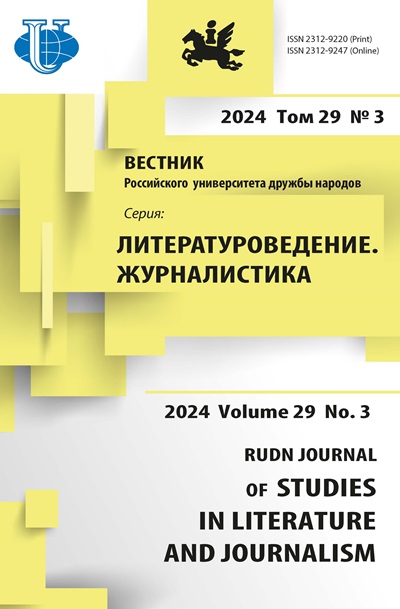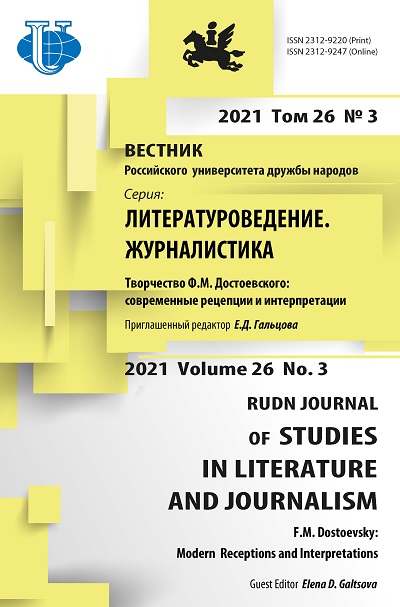Gaming Slang Terms in Russian Online Media: A Case Study of News Articles
- Authors: Volkova I.I.1, Chernyavskaya A.G.1
-
Affiliations:
- Peoples’ Friendship University of Russia (RUDN University)
- Issue: Vol 26, No 3 (2021): F.M. DOSTOEVSKY: MODERN RECEPTIONS AND INTERPRETATIONS
- Pages: 580-588
- Section: JOURNALISM
- URL: https://journals.rudn.ru/literary-criticism/article/view/27659
- DOI: https://doi.org/10.22363/2312-9220-2021-26-3-580-588
Cite item
Full Text
Abstract
The goal of this study is to identify gaming slang terms in the news articles of highly rated Russian media. Three online newspapers of various types were used as an empirical material: Kommersant (the first private business newspaper in Russia), RBC (a socio-political analytical newspaper) and Rossiyskaya Gazeta (agency of the Russian Federation government). With help of the content analysis of the media texts, all cases of using the slang gaming terms such as “achievement”, “noob”, “easter eggs” etc. have been discovered and described. The results of the study show that over the past five years the popularity of the gaming terms usage in the media has been growing; this increase can be described as a linear progressive growth: gaming slang is becoming an integral part of the Runet online resources and is gradually entering common vocabulary. It can be assumed that with the increase in the number of media managers from the generation of digital natives and their transition to the category of “decision makers”, the growth of gaming slang terms in online media will become exponential.
About the authors
Irina I. Volkova
Peoples’ Friendship University of Russia (RUDN University)
Author for correspondence.
Email: irma-irma@list.ru
ORCID iD: 0000-0002-2693-1204
Doctor of Philology, Professor of the Department of Mass Communication, Philological Faculty
10 Miklukho-Maklaya St, bld 2, Moscow, 117198, Russian FederationAlina G. Chernyavskaya
Peoples’ Friendship University of Russia (RUDN University)
Email: alya_z@inbox.ru
ORCID iD: 0000-0002-0597-5128
PhD Student of the Department of Mass Communication, Philological Faculty
10 Miklukho-Maklaya St, bld 2, Moscow, 117198, Russian FederationReferences
- Komarov, V.A., & Shusharina, A.I. (2019). Game slang in modern Russian. Bulletin of the Kurgan State University, 52(1), 88–90. (In Russ.)
- Yegoshina, N.B. (2013). Slang expressions application on mass media as a result of lexical borrowings. News of higher Schools. Series “Humanities”, 4(2), 102–107. (In Russ.)
- Vikulov, V.V. (2017). Journalism in eSports. Vestnik TVGU. Series: Philology, (3), 198–201. (In Russ.)
- Chernyavskaya, A.G. (2018). Specificity of eSports broadcast. Mass Communication in a Multipolar World: Problems and Prospects. Materials of the IX All-Russian Scientific and Practical Conference (pp. 255–259). Moscow: PFUR, 2018. (In Russ.)
- Shcherbinina, V.E. (2018). The language of gamers as a component of youth slang. In Philological sciences. Questions of theory and practice, 81(3). Part 2, 395–398. (In Russ.)
- Volkova, I.I. (2017). Video games and new media: game approach to communications within virtual space. RUDN Journal of Studies in Literature and Journalism, 22(2), 312 –320. (In Russ.) doi: 10.22363/2312-9220-2017-22-2-312-320
- Volkova, I.I. (2018). Screen-based communications as an indicator of the perception of media reality: the social status and generation aspect. Vestnik Moskovskogo universiteta. Seriya 10. Zhurnalistika, (4), 124–138. (In Russ.) http://10.30547/vestnik.journ.4.2018.124138
- Enbaeva, L.V., & Khanzhin, Yu.S. (2018). Discursive characteristics of computer games: a comparative analysis. Bulletin of Perm national research Polytechnic University. Problems of linguistics and pedagogy, (4), 113–122. (In Russ.) http://10.15593/2224-9389/2018.4.10.
- Efimova, N.I., & Morzhanaev, N.I. (2015). Text in a computer game: philological aspect. Vestnik of the Mari State University, 19(4), 75–78. (In Russ.)
















